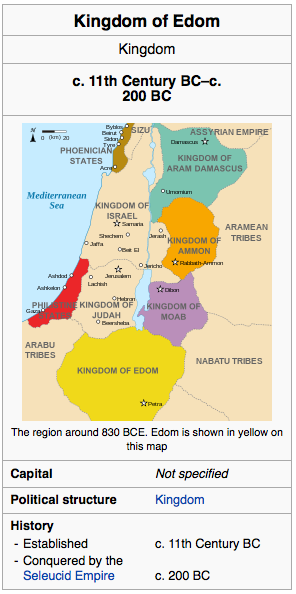Obadiah is the shortest book in the Old Testament. In 586, Babylon destroyed Jerusalem. The Israelites fled the city, but in the process, the Edomites (the descendants from Esau) captured them and gave them over to the Babylonians. The Edomites then took up residence in some of the Judean towns once they were vacated by the Jews.
Esau was the brother of Jacob and therefore the Edomites were relatives to the Jews. Yet they chose to side with Babylon, rather than Judea. This angered the Lord. The Book of Obadiah was the prophetic promise that Edom would be punished for their betrayal.
Ps. 137.7 was written while Judah was in Babylonian captivity. The Psalmist writes of the Edomites and their role in the destruction of Jerusalem.
Lamentations is a book that also recounts the destruction of Jerusalem by the Babylonians. It too reminds the reader of the role of Edom. The book of Lamentations and the book of Obadiah interact with the same theme.
Lamentations 4:19
Our pursuers were swifter than the eagles in the heavens; they chased us on the mountains; they lay in wait for us in the wilderness.
Obadiah 1.4
Though you sore aloft like the eagle, though your nest is set among the stars, from there I will bring you down declares the Lord.
Lamentations 4.20,21
The breath of our nostrils, the Lord’s annointed, was captured in their pits, of whom we said, “Under his shadow we shall live among the nations”
Rejoice and be glad, O daughter of Edom, you who dwell in the land of Uz; but to you also the cup shall pass; you shall become drunk and strip yourself bare.
Obadiah 1.16
For as you have drunk on my holy mountain, so all the nations shall drink continually; they shall drink and swallow, and shall be as though they had never been.
The imagery of the cup (of wine) and stripping bare reminds me of Noah.
Genesis 9.20,21
Noah began to be a man of the soil, and he planted a vineyard. He drank of the wine and became drunk and lay uncovered in his tent.
Genesis 9 has language regarding incest and/or rape. Leviticus 18 seems to shed light on this:
Leviticus 18.6-8
None of you shall approach any one of his close relatives to uncover nakedness. I am the Lord. You shall not uncover the nakedness of your father, which is the nakedness of your mother; she is your mother, you shall not uncover her nakedness. You shall not uncover the nakedness of your father’s wife; it is your father’s nakedness.
also
Leviticus 20.17
If a man takes his sister, a daughter of his father or a daughter of his mother, and sees her nakedness, and she sees his nakedness, it is a disgrace, and they shall be cut off in the sight of the children of their people. He has uncovered his sister’s nakedness, and he shall bear his iniquity.
So one interpretation of Genesis 9 (and one in which I subscribe to) is that Noah became drunk and Ham then raped Noah’s wife (which I assume was Ham’s mother). The result of this was cursing of Canaan (Noah’s grandson). It would seem that Canaan was the result of Ham’s incestuous relationship with his mother.
This is a theme repeated in Genesis 19.30-38. Lot becomes drunk. His daughters rape him. The result is two children which stem two nations (the Moabites and the Ammonites).
Lamentations 4.20,21 speaks of Edom becoming drunk and getting naked. As the other examples above illustrate, getting drunk and then naked doesn’t end well. It is imagery for something really horrible to happen.
Ezekiel, taken into Babylonian captivity, also prophesied of Edom’s impending destruction and has parallels in Obadiah.
Ezekiel 25.12-14
Thus says the Lord God: Because Edom acted revengefully against the house of Judah and has grievously offended in taking vengeance on them, therefore thus says the Lord God, I will stretch out my hand against Edom and cut off from it man and beast. And I will make it desolate; from Teman even to Dedan they shall fall by the sword. And I will lay my vengeance upon Edom by the hand of my people Israel, and they shall do in Edom according to my anger and according to my wrath, and they shall know my vengeance, declares the Lord God.
Obadiah 1.9
And your mighty men shall be dismayed, O Teman, so that every man from Mount Esau will be cut off by slaughter.
Teman (and Dedan) were Edomite cities. The precise location of Teman is not known, but was named after Esau’s grandson (the son of Esau’s firstborn Eliphaz). It appears that Teman is at times a term that denotes an Edomite. Jewish tradition attributes great wisdom to the Temanites and Obadiah 1.8 seems to suggest the same “…the wise men out of Edom”.
The History of Edom
Edom means red in Hebrew, an obvious reference to ruddy Esau. To the northeast of Edom was Moab. Near this area was the Edomite city of Sela, which was later known by the Latin Petra (which is in Jordan today).
Genesis 36.31-33 references 8 kings that ruled Edom prior to Israel having kings.
Israel’s first tension with the Edomites begins on their departure from Egypt and on their way to Canaan. The King of Edom refused Israel to pass through their land, and as such Israel detoured around Edom.
It’s not until the 11th century where we hear of the Edomites again in 1 Samuel 14.47. King Saul is recorded fighting against them, as well as the Ammonites and Moabites (the descendents of Lot’s incestuous relationship), and against the kings of Zohab and the kings of the Philistines. Forty years later King David continued the fight against the Edomites and they eventually become a subjugated vassal state of Israel.
After Solomon’s death (and when the Kingdom of Israel divides), Edom falls under the rule of the Southern Kingdom. Later, during the reign of King Jehoram of Judah, Edom joins Ammon and Moab and rebels against Judah.
Four kings of Judah later, King Amaziah, goes to war against the Edomites once again, but they are never completely destroyed.
This was the history of Israel and Edom up until the point Israel is conquered by the Babylonians.
Deuteronomy 23.7
You shall not abhor an Edomite, for he is your brother. You shall not abhor an Egyptian, because you were a sojourner in his land.
When Greek became the common language, the Edomites were called Idumaeans. With the rise of the Roman Empire, an Idumaean whose father had converted to Judaism was named king of Judea. That Idumaean is known in history as King Herod the Great.
I sense a parallel between the history of Edom and Israel (Esau and Jacob) and the story of Joseph and his brothers. In many ways, I can relate and empathize with Edom (and Joseph’s brothers). Wasn’t Edom looking out for its own welfare when it refused Israel to enter its land? Would this act justify Israel later waging war against Edom and subsequently enslaving them by making them a vassal state? Who wouldn’t be able to relate to Edom’s dislike for Israel?
And who wouldn’t be able to relate to Joseph’s brothers (at least to a lesser degree)? Joseph seemed like a spoiled brat that had no self-awareness of how he came across or treated others.
But despite how Israel or Joseph acted, they were elected by God for his purpose. And others were expected to respect that. Joseph’s brothers didn’t, so they threw Joseph into a pit and later sold him into slavery (which could have been worse than death). Edom didn’t do that, so they captured fleeing Judeans and sold them to the Babylonians. Both responses seem rather extreme though. And both responses had demonstrated a full denial of God’s purpose through those oppressed.

